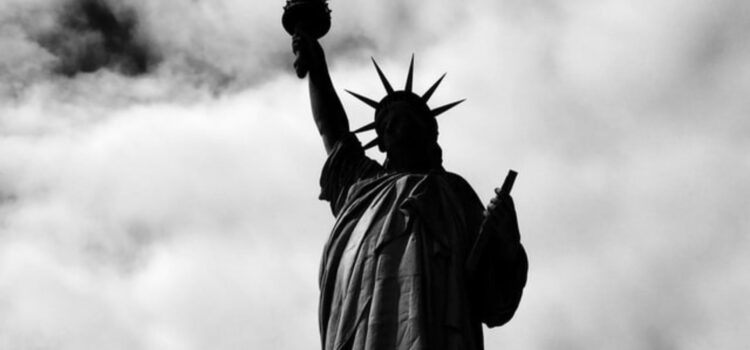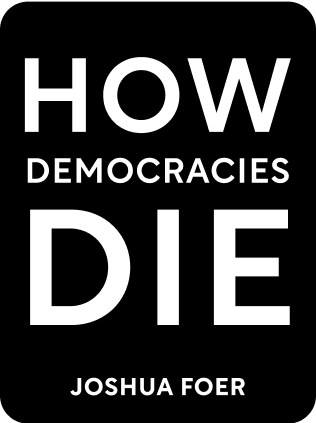

This article is an excerpt from the Shortform book guide to "How Democracies Die" by Steven Levitsky and Daniel Ziblatt. Shortform has the world's best summaries and analyses of books you should be reading.
Like this article? Sign up for a free trial here .
Is democracy dying? Is America sliding into authoritarianism? What can be done to salvage democratic norms?
According to Levitsky and Ziblatt, the authors of How Democracies Die, democracy operated successfully throughout most of the 20th century, despite some challenges. But, they warn, democratic norms are under siege today and may be slipping away entirely.
In this article, we’ll explore some key structural transformations in United States politics over the past few decades that are pushing democratic norms to the brink.
The Election of Donald Trump
Is democracy dying and did Donald Trump initiate it? The authors of How Democracies Die see the success of Donald Trump as a critical failure by a major political party to stop an authoritarian figure from rising within their own ranks. But, the authors argue, the emergence of Trump did not occur in a vacuum. They view him as a product or symptom of broader trends in the American political system—and the Republican Party in particular—that have gradually driven the degradation of democratic norms since arguably the middle of the 20th century.
The Rise of Newt Gingrich
The authors argue that the rise of Newt Gingrich as a major political player signaled the beginning of the transformation of American politics into the more partisan, ideological conflict that it is today. In 1978, Gingrich, a Georgia Republican, was elected to the U.S. House of Representatives. But Gingrich, say Levitsky and Ziblatt, was no ordinary Republican.
They argue that he had a view of politics as warfare, believing that defeating one’s enemies was its ultimate purpose—not working with rivals or seeking to find common ground with them. As he rose through the ranks, Gingrich formed the political-action committee GOPAC to train up-and-coming Republican politicians in these new attack messaging strategies, labeling Democrats as “sick,” “traitors,” and “anti-flag.”
Gingrich rose through the ranks of the GOP’s congressional wing throughout the 1980s, remaking it in his image and systematically destroying norms of mutual toleration. By 1994, say the authors, Gingrich had transformed the party into one deeply committed to social and economic conservatism, opposed to compromise, and scornful of its opponents.
| Gingrich and the Revival of the GOP Despite Levitsky and Ziblatt’s seemingly unflattering characterization of Gingrich’s role in American history, other commentators have defended him. It’s been argued Gingrich was an important figure in revitalizing the congressional wing of the Republican Party, which had been in the House minority for 40 years before the 1994 midterm elections. During these four decades in the political wilderness, the Republicans were only able to amend, defeat, or delay proposals by the majority Democrats—they were never able to initiate a vision of their own. That changed in 1994 with Gingrich’s Contract With America, a sweeping legislative agenda of tax reform, tort reform, and welfare reform, among other items. Proponents credit the Contract With America with bringing ideas and a coherent governing agenda back to congressional politics, and to the congressional GOP in particular. |
The Clinton Impeachment
Levitsky and Ziblatt cite the 1998 party-line impeachment of Bill Clinton—on what they characterize as spurious and petty charges related to an extramarital affair—as the culmination of Republican-led hyper-partisanship during the 1990s.
The authors argue that this was a major breach of institutional forbearance and a blatant abuse of the impeachment power. In their account, Clinton’s behavior did not come close to meeting the standard for impeachment, and the Republican majority cheapened the constitutional power of impeachment by turning it into another partisan tool.
| Bill Clinton and #MeToo While Levitsky and Ziblatt dismiss the impeachment charges against Clinton as being spurious and motivated by partisan concerns, in the decades since the impeachment, many liberals—a group that was among his staunchest defenders during the ordeal—have taken a more critical view of Clinton’s extramarital affair with the White House staffer Monica Lewinsky. In 2017, U.S. Senator Kirsten Gillibrand (D-NY)—later a 2020 presidential candidate—was quoted as saying that Clinton should have been forced to resign over the scandal, which, in light of the burgeoning #MeToo movement, she saw as an act of sexual predation on the part of Clinton toward a female subordinate. |

———End of Preview———
Like what you just read? Read the rest of the world's best book summary and analysis of Steven Levitsky and Daniel Ziblatt's "How Democracies Die" at Shortform .
Here's what you'll find in our full How Democracies Die summary :
- How shared norms are essential for preserving democracy
- Why the Trump presidency threatened those shared norms
- Why democracy goes beyond individual leaders and parties and must be a shared enterprise among committed individuals






